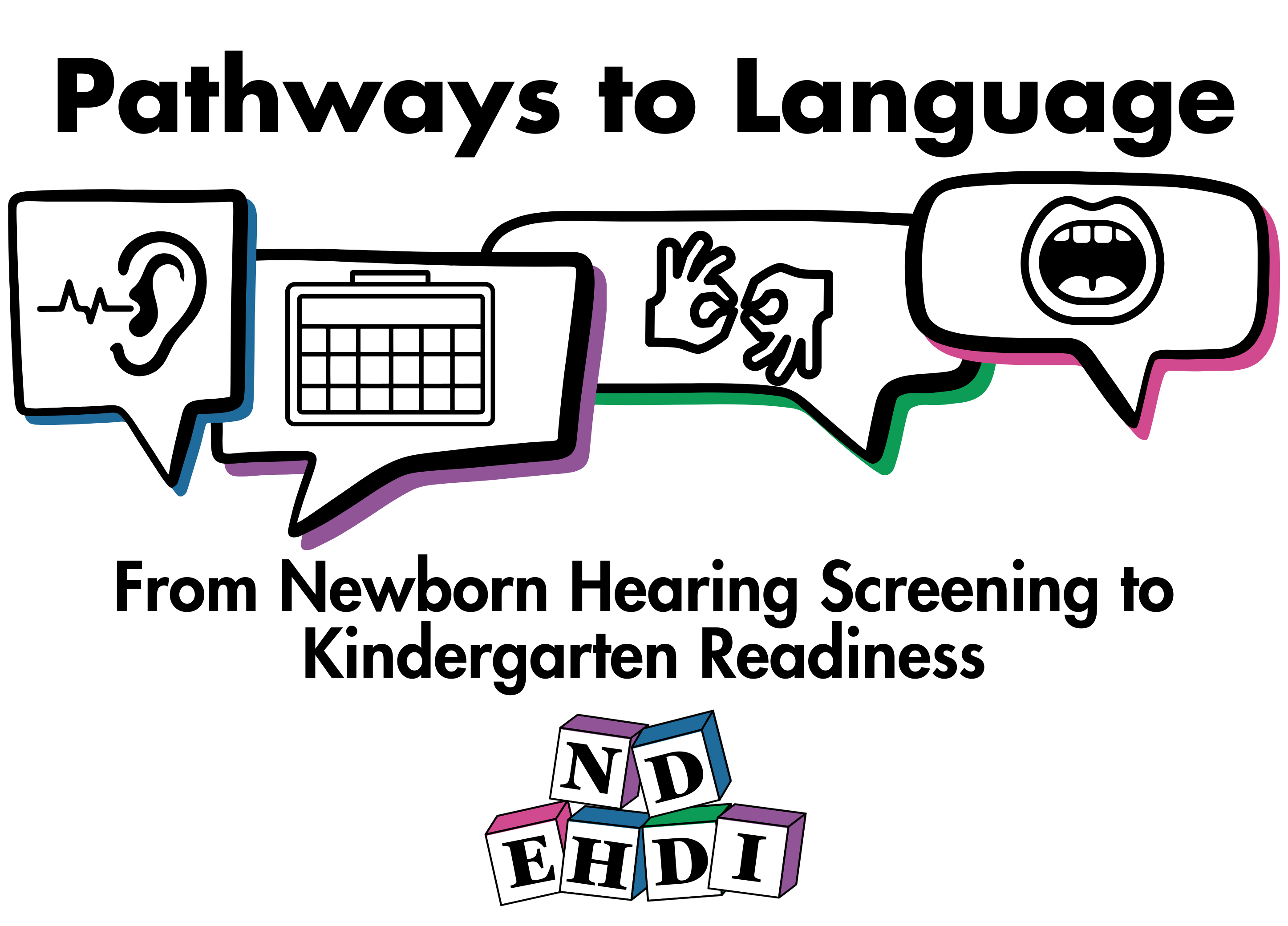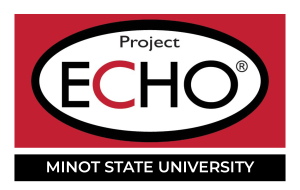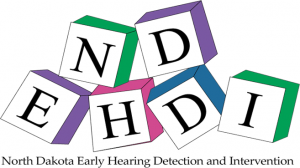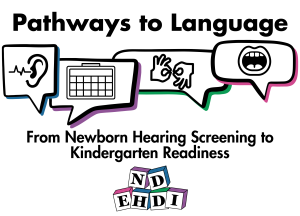
Pathways to Language ECHO®: From Newborn Hearing Screening to Kindergarten Readiness
Target Audience:
Nurses, Audiologists, Early Interventionists, Social Workers, Parents, Primary Care Providers, Speech-Language Pathologists
Every Tuesday:
January 14, 2025 – February 25, 2025
12:00 pm – 1:00 pm CST
View Recorded Sessions
ECHO Resources
View Participant Guide
Case Presentation
For more information, contact Krista Opstedal
krista.opstedal@minotstateu.edu


The Pathways to Language: From Newborn Hearing Screening to Kindergarten Readiness ECHO series aims to enhance the knowledge of stakeholders regarding the Early Hearing Detection and Intervention (EHDI) system and to build state/territory-level data and measurement capacity to improve language acquisition outcomes for deaf/hard-of-hearing (DHH) children.
This web-based ECHO series will deliver didactic presentations and peer-to-peer learning collaboratives to improve language acquisition outcomes for DHH children identified up to age three. These sessions will focus on defining language acquisition, how language acquisition is related to the EHDI system, the importance of newborn hearing screening, current system practices, and discussion on ways to conduct, measure, and collect language acquisition data to improve outcomes.
Barriers to Language Acquisition:
- Insufficient knowledge about language acquisition among providers and parents
- Lack of communication, collaboration, care continuity, and protocols/procedures between agencies, along with unclear protocols and procedures
- Newborn hearing screening is not currently mandated in the state of North Dakota
- Increasing rates of refusal of newborn hearing screening
Our training series aims to equip early intervention and pediatric healthcare professionals with knowledge of the EHDI system, language acquisition, interagency communication and collaboration, and family support using compassionate care strategies. By fostering a deeper understanding of these essential elements, we hope to empower professionals to effectively address the barriers faced by DHH children and their families. Participants will learn best practices for engaging with families, advocating for timely newborn hearing screenings, and implementing data-driven approaches to measure and enhance language acquisition outcomes. Ultimately, our goal is to create a more cohesive support network that promotes positive language development for DHH children from birth through kindergarten readiness.
Key Focus Areas:
- Understand the EHDI system framework and its importance in identifying hearing loss early
- Learn the fundamentals of language acquisition, emphasizing the developmental milestones for deaf and hard-of-hearing (DHH) children
- Recognize the role of newborn hearing screening in early detection, intervention, and overall developmental outcomes
- Identify best practices for fostering communication and collaboration among healthcare providers, educators, and families to ensure continuity of care
- Gain strategies for providing compassionate care and support to families of DHH children, including resources and advocacy
- Address common barriers to language acquisition, including misconceptions, systemic issues, and family dynamics
- Participate in facilitated discussions and collaborative problem-solving sessions to share experiences, challenges, and solutions
The Health Resources and Services Administration (HRSA), Department of Health and Human Services (HHS) provided financial support for this ECHO series through the Universal Newborn Hearing Screening Innovation award (6 H61MC00028‐24‐03). The award provided 19% of total costs and totaled $14,529. The contents are those of the author. They may not reflect the policies of HRSA, HHS, or the U.S. Government.
Pathways to Language ECHO®
Target Audience: Nurses, Audiologists, Early Interventionists, Social Workers, Parents, Primary Care Providers, Speech-Language Pathologists
Every Tuesday: January 14, 2025 – February 25, 2025
12:00 pm – 1:00 pm CST
| Session Title | Date | Archived Recordings |
|---|---|---|
| Session 1: Language Acquisition: What Is It? As a result of attending, participants will be able to: • Explain what language acquisition is and differentiate it from language learning. • Discuss factors that influence language acquisition in DHH children. • Understand the relationship between access to language and language acquisition outcomes in children. • Articulate the importance of early intervention services in supporting DHH children. • Examine how family dynamics and involvement can impact language acquisition and the importance of supporting families in this process. Speaker:Dr. Onudeah Nicolarakis Dr. Onudeah Nicolarakis holds a Bachelor's degree in Early Childhood Education and a Master's degree in Deaf Education from Gallaudet University, as well as a Doctorate in Education of the Deaf and Hard of Hearing from Columbia University. Her research and professional interests include functional writing development, critical theory, transformative learning and pedagogy, ASL/English literacy, fingerspelling, mixed methodology, and school reform. Dr. Nicolarakis has extensive teaching experience, having worked at the California School for the Deaf-Fremont, Texas School for the Deaf, Lexington School for the Deaf, P.S. 347: The ASL/English Dual Language Lower School, New York School for the Deaf as a curriculum specialist, LaGuardia Community College, and Teachers College, Columbia University. | January 14, 2025 12:00pm - 1:00 pm CST | Watch Now |
| Session 2: Early Hearing Detection & Intervention (EHDI) and Language Acquisition As a result of attending, participants will be able to: • Describe the EHDI system. • Articulate the importance of early detection of hearing loss on language acquisition outcomes. • Recognize the roles of stakeholders involved in the EHDI process. • Explore effective communication strategies for engaging families during the EHDI process to ensure they understand the implications of hearing loss and intervention options. • Identify common barriers to effective EHDI implementation and discuss potential solutions to overcome these challenges. • Explain how timely EHDI services can positively influence language acquisition for DHH children. Speaker: Dr. James McCann James (Jim) McCann, Ed.D., CCC-SLP is a faculty member in the speech-language pathology program at Gallaudet University. His teaching and research interests are in language and literacy acquisition in deaf and hard-of-hearing (D/HH) children. He serves as the speech and language services specialist for the Beacon Center. Prior to joining Gallaudet, he worked as an SLP providing services to D/HH children and their families in the infant-toddler, early childhood, elementary, high school, and deafblind programs. | January 21, 2025 12:00pm - 1:00 pm CST | Watch Now |
| Session 3: Screening & Diagnosing a Hearing Loss As a result of attending, participants will be able to: • Outline the steps involved in the newborn hearing screening process, including various screening methods and technologies used. • Recognize the roles of different healthcare professionals involved in the screening and diagnosis of hearing loss, such as audiologists, pediatricians, and ENT specialists. • Effectively communicate the screening and diagnosis process to families, using clear and supportive language. • Identify common barriers that may prevent families from accessing screening and diagnostic services and discuss strategies to address these barriers. • Learn how to provide families with educational resources and support regarding the implications of hearing loss and the next steps in intervention. Speaker: Joscelyn Martin, Au.D. Joscelyn Martin, Au.D. is a pediatric audiologist specializing in diagnostic audiology and early hearing detection and intervention (EHDI) at the Mayo Clinic. She ran their newborn screening program for years and was instrumental in cCMV screening protocols in MN. | January 28, 2025 12:00pm - 1:00 pm CST | Watch Now |
| Session 4: Compassionate Care- Strategies for How to Have Difficult Conversations Speaker: Amy Gaviglio Amy Gaviglio is a genetic counselor and founder of Connetics Consulting, LLC which provides newborn screening, genomics, and rare disease services globally. She has worked in the NBS and rare disease space for the past 17 years. Amy currently works with the Centers for Disease Control and Prevention, the Association of Public Health Laboratories (APHL), Expecting Health, RTI International, and several other rare disease and genomics organizations. She is co-chair of APHL’s New Disorders in Newborn Screening Subcommittee and is a member of additional national groups including the Rare Disease Diversity Coalition and EveryLife Foundation’s Community Congress. She also serves on the Executive Board for the International Society of Neonatal Screening and is a member of the MPS Society’s Scientific Advisory Board. Finally, Amy serves as Chair of the NBS Expert Panel for the Clinical and Laboratory Standards Institute. | February 4, 2025 12:00pm - 1:00 pm CST | Watch Now |
| Session 5: Hearing Loss and Early Intervention Services/Parent Infant Program As a result of attending, participants will be able to: • Explain the roles of early intervention and the parent infant program in supporting the developmental and language needs of children with hearing loss. • Learn to guide families through the various early intervention services available, helping them make informed decisions about communication methods (e.g., auditory, visual, or combined approaches). • Understand how to create individualized intervention plans that prioritize language acquisition and family involvement, while addressing each child’s hearing loss and communication needs. Speaker: Nicole Swartwout & Jordan Anderson Nicole Swartwout, M.Ed., TOD/HH and ECSE is the Parent-Infant and Outreach Specialist and Coordinator of the Parent-Infant Program and School Age Outreach for the North Dakota School for the Deaf serving children and families in their homes and communities ages birth to age five years as well as students in schools that need support. Nicole has 24 years of experience working in the field of special education as an Early Childhood Special Educator as well as an educator of children who are Deaf and/or Hard-of Hearing. Nicole is also an adjunct professor for Deaf Education courses at Minot State University. Jordan Anderson, M.S., specializes in Early Childhood Special Education with over a decade of experience in early intervention. She currently serves as the Early Intervention Specialist for North Dakota Health and Human Services Developmental Disabilities. In addition to her state-level role, Jordan is a part-time instructor in the Department of Teaching and Leadership at the University of North Dakota, where she teaches courses in Early Childhood Special Education and Autism Spectrum Disorder. Her professional interests center around supporting early intervention families and enhancing collaborative services for young children and their families. | February 11, 2025 12:00pm - 1:00 pm CST | Watch Now |
| Session 6: North Dakota School for the Deaf/Deaf Mentor Program As a result of attending, participants will be able to: • Explain how the Deaf Mentor Program supports language acquisition by providing DHH children and their families with direct exposure to Deaf culture, sign language, and communication strategies. • Describe the various services provided by the North Dakota School for the Deaf that promote early language acquisition and development. • Explore how exposure to Deaf mentors and role models can enhance DHH children's language acquisition by providing natural language models and fostering positive communication experiences. • Support families in utilizing resources and strategies from the Deaf Mentor Program to foster language development in both visual (sign language) and auditory (spoken language) modes, depending on the family's goals. Speaker: Donna Sorensen | February 18, 2025 12:00pm - 1:00 pm CST | Watch Now |
| Session 7: Language Acquisition: Assessment, Documentation, and Predictors of Outcomes Documenting and understanding the language outcomes of children who are deaf or hard of hearing is a critical step in maximizing the language skills of this population. This webinar will explore language outcomes from a variety of perspectives. First, we will cover important considerations when selecting language assessments in terms of both measuring an individual child’s language abilities and when documenting language strengths and challenges across a program or state. General considerations for all children as well as specific issues for sub-groups will be shared. Additionally, we will present information about the language abilities of children with differing hearing levels along with factors that are associated with higher language skills and characteristics that put some children at more risk for language delay. After attending this webinar, participants will be able to: • Suggest specific fields to include in a developmental outcomes database • List considerations when selecting language assessments for children who are deaf/hard of hearing, including specific sub-groups of children (e.g., children with unilateral hearing differences • State at least two important considerations when selecting assessments to monitor child language skills state- and/or program-wide • Describe factors that are associated with higher language outcomes in children who are deaf/hard of hearing and factors that put some children at more risk for language delay Speaker:Allison Sedey Allison Sedey is a speech pathologist, audiologist, and researcher. She is currently the director of the Early Language Outcomes Lab (ĒLO) at the University of Colorado-Boulder and is the assessment and accountability coordinator for the Early Intervention Outreach Program at the Colorado School for the Deaf and the Blind. Dr. Sedey received her Ph.D. from the University of Wisconsin-Madison where she studied language acquisition in children who are deaf/hard of hearing as well as in children who have Down syndrome. For the past 30 years, she has served as the director or project coordinator on a variety of grant-funded research projects examining predictors of language outcomes in young children who are deaf or hard of hearing. | February 25, 2025 12:00pm - 1:00 pm CST | Watch Now |


